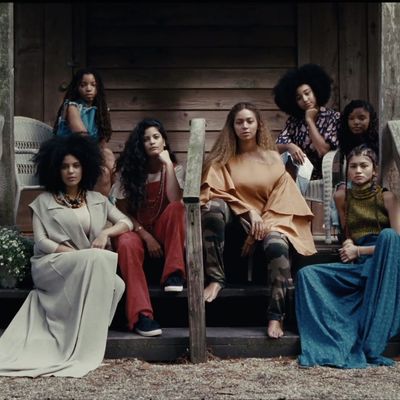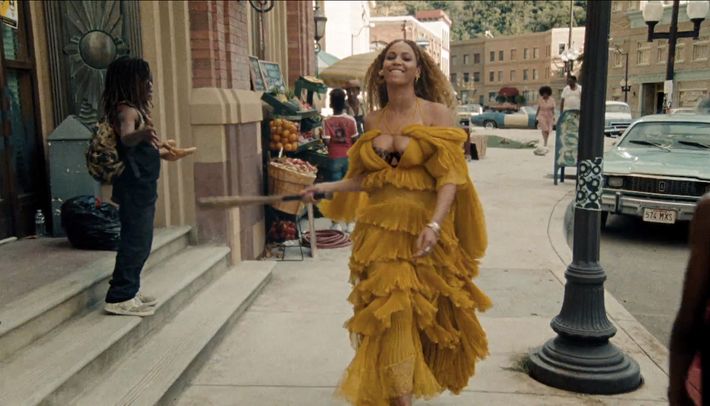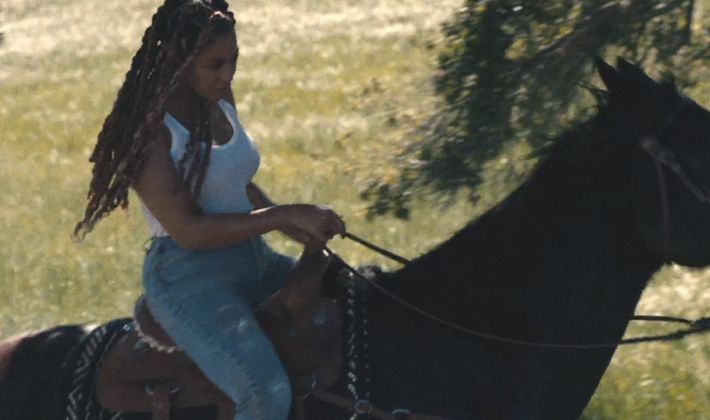
Where do we begin with Beyoncé’s Lemonade? The pop juggernaut dropped her sixth album almost exactly like she did her last: mostly without warning and with 12 accompanying videos, this time premiering on HBO all at once. Now that we’ve given it the proper time to slay us, we’re ready to get in formation and discuss. Vulture editor Dee Lockett and the Cut editors Ashley Weatherford and Lindsay Peoples unpack their thoughts on those Jay Z cheating rumors, the now-infamous Becky, Beyoncé’s increasing normalcy, and more. (Read our previous roundtable on “Formation” here.)
Who do we think Lemonade is for? Jay Z, Beyoncé’s dad, black women, all of the above?
Ashley Weatherford: Right about now a lot of people are speculating who this album is about. Well, let me tell you who: It’s about a dude who lost his goddamn mind and then Beyoncé put his shit on blast. This man needs all of your prayers right now. He has the Beyhive, the Beygency, and the Beyconglomerate marching, pitchforks in hand. Pray for “Becky with the good hair,” too. Although her hair may no longer be “good” since Beyoncé shaved her edges into a withering pulp last night.
But seriously, who is this album about? The good-willed person inside of me doesn’t want to say it’s about Beyoncé and Jay Z. That’s too much to handle. In fact, I refuse to believe it’s about those two and is instead more of a general indictment of the bullshit that oozes in the wake of infidelity and pitfalls. As Beyoncé puts it, there’s intuition, denial, anger, apathy, accountability, reformation, forgiveness, resurrection, and then a leap of faith to move forward. Did Beyoncé assert her own feminist twist on moving forward from betrayal? Maybe. But she certainly acknowledged that infidelity and setbacks are facts of life for many, even for a person recognizable by just her first name.
Lindsay Peoples: I think this album is a love letter to black women. An hourlong I love black women, I love your struggle, I love your tenacity, I love your will to win, I love that you’ve turned lemons into lemonade special. I couldn’t even count how many black women were part of this visual album. Lemonade is pure black excellence.
Yes, it has a lot to do with the struggles you go through being married in the spotlight — they’ve been married eight years now, and they’re not perfect. To me it was a general I’m tired of the potential of bullshit, because she never truly admits to finding this supposed person cheating. That leads me to believe that a lot of her anger came from her dad’s infidelities — even calling him a magician — since her parents had been married for decades and he ended up having a child with another woman that broke their family apart.
I do find it a bit coincidental that Rachel Roy Instagrammed about having ‘good hair” last night, and she was the same person Solange was arguing with before the elevator incident at the Met Gala party two years ago, but Beyoncé is no dummy. They’ve hardly shared about their personal life, so I don’t see why she would use an HBO special to start talking about her marriage. This is the same person who wrote “Single Ladies” and other songs about being single while being married the whole time.
Dee Lockett: I asked who this album is for and not to, because I think if we read too much into the subject of certain songs, we’d come up short. Beyoncé is an expert at vague honesty and indirect revelations. You think she’s removing layers by making ultimatums like “if you try this shit again, you gon‘ lose your wife” and throwing the Beckys of the world under the bus — making us all think her surprise drop would come with divorce papers — only to reconcile with the man she says killed her a few songs later and put the album on the service he owns. We learn so much only to know nothing at all.
I think this album is for women in pain, struggling with the grievances of men. I also think it’s a meditation on the way black people love: Our love is always political, it has no choice. When it fails, it’s a failure for all black lovers. Not even Beyoncé can readily say the words, “My husband cheated on me … and I stayed” because it would destroy the fantasy. Young people, young black people especially, believe so much in their love, even despite all the obvious indiscretions, because it gives them hope that their own will last. It has to last. Beyoncé couldn’t make this album and not show Jay Z’s face — what would that do to black people? Instead, she redirects her anguish and shares a close-enough story: her father’s. Her continuing to work through that heartache and have to face history repeating itself makes this just as much an album for Beyoncé than anyone else. It’s peak self-care.

Let’s dissect some of the album’s standout visual moments.
Lindsay: I can’t get over the “Hold Up” part of the visual album. It almost felt like we were watching the Solange come out in Beyoncé. It’s nice to see her in this way — it’s a natural human emotion to be angry, and we see her in a place that many women have found themselves: confused, angry, and still full of love for a man. I love when Bey gets gangsta, so I enjoyed “Don’t Hurt Yourself.” I don’t know what it is about when she gets cocky and brags, but it somehow transfers to women who are watching on the couch and ceremoniously look around and say, You know what, I deserve that too.
Visually, “Sandcastles” was shot so beautifully, and it’s important to note the vulnerability of Jay-Z kissing her ankles, because you don’t see that everyday. I was watching a bunch of Prince interviews, one in particular where he was talking about how he was impressed by Beyoncé and that the only thing she could do was learn the piano and she would be unstoppable. Well, Beyoncé learned damn piano.
Ashley: I liked the use of greater New Orleans as a backdrop again. Did you see her walking through the tall grass during “Pray You Catch Me”? I couldn’t help but think of a similar image in 2006’s “Deja Vu,” during happier times of course.
Three visuals really stood out to me: The whole of “Sorry” was a masterpiece. First there was Serena “Needs No Introduction” Williams. Then there’s Beyoncé alone in a room wearing a crown worthy of Nefertiti that’s made entirely of braids. To cap it all off, at one point Beyoncé says “suck on my balls.” Sorry, that’s not exactly a visual, but it’ll certainly be my personal mantra for the summer.
Dee: There are so many moments from this film tattooed on my memory, but the one I know isn’t going anywhere soon is “Forward.” Seeing the mothers of Travyon Martin and Michael Brown dressed like queens, honoring their young princes whose lives were taken from them, will stay with me forever.
But what moved me most from that scene was that Mardis Gras Indian girl shaking her tambourine around a dinner table with no guests. I get emotional just thinking about the stillness of that scene. Maybe I’m wrong, but I interpreted that as her conjuring the spirits of Trayvon, Michael, and all the black men who should be there, at that table with their mothers, sisters, wives, grandmothers, and all women. I also see it as a casting out of all the evil energy that took their lives too soon, a way to free the women from any lingering demons. There are healing powers in that girl’s tambourine, I know it.
What a black girl squad Bey managed to assemble. Did you ever predict Serena would slay a Beyoncé video?
Lindsay: One of the things that saddens me most about celebrity culture right now is that people feel everything has to be done out in the open, televised, and publicized, a.k.a. Kardashian culture. Beyoncé has quietly been spending time with Sabrina Fulton and Leslie McSpadden for quite some time now and supported the Black Lives Matter movement because she really does care about black people — if you didn’t already get that by watching this video.
It’s usually one black woman or black male considered as a cameo on music videos, so seeing different generations and different skin tones of black women gives me a magical tingle. Quvenzhané Wallis, Zendaya, Winnie Harlow, Amandla Stenberg … I was living for every moment. Also, when you get to the point in your life when Serena Williams is your video girl, you’re on a different level.
Dee: Unfortunately, the overeager BeyHive ruined the surprise memorial with the mothers of Trayvon and Michael, so the only time my mouth genuinely dropped from a cameo was hands-down Serena. I only wish she’d been there for that final scene on the steps with Zendaya, Amandla, Chloe x Halle, and Ibeyi. Every aesthetic choice Bey makes holds meaning, and her selecting these woman whose blackness — especially their black beauty — has individually been criticized feels so commendably deliberate.
I know it might seem a bit uninspired to put the stars of the woke teen moment and the greatest tennis player who ever lived in your video, but think about what they represent within the confines of black womanhood. Think even harder about what it’ll to mean to the next generation of magic black girls to see them in a Beyoncé video. I can’t stress that last part enough.
Which songs are you already obsessed with?
Lindsay: I’ve been listening to “All Night” on repeat for hours! It’s just so powerful to hear her sing about being broken and finding redemption and solace in love. She’s this almost non-human perfect celebrity to so many people, and to see her stoop to our level and explain her emotions is just the reality we needed.
Ashley: I’m trying to ascertain what happened in “Daddy Lessons.” I think it was a country song and I think that I liked it. I enjoyed “Sorry” for the aforementioned reasons (recap: Serena Williams, Nerfiti braids, and balls), but also because it’s a 101 on Beyoncé’s badass feminist credo. And I can’t discuss standout songs without mentioning “Freedom.” For starters, Kendrick Lamar emerges halfway through the track. Remember when people were trying to pit the two against each other when “Formation” dropped? Well now that hollow argument has officially sunk. On another note, “Pray You Catch Me” is church for the weary soul and Jack White’s “Don’t Hurt Yourself” riff has now earned a spot as the theme song to my workouts.
Dee: Much as I enjoy watching Beyoncé snap and continuously outrap her husband in the album’s savage first half, I find myself revisiting the soul-searching second half — the part that isn’t just a vessel for raw batshit impulses. (Though I get why it’s necessary to go through the fires of hell before you can even attempt to wash them away.)
“Daddy Lessons” is the country bop I never knew I needed from Beyoncé, and it makes sense that it would show up on album that ticks off every classic trope in the country songbook. Beyoncé is probably the least relatable pop star alive, and yet I can’t express how comforting it is anytime she reminds us that she has daddy issues, too. The realest thing she can do is recognize that she may have married a scoundrel just like her father, and keep on working out what that means, if anything, for the rest of her life in song. This album never promises to offer more answers than questions, and just the thought that that might be Blue Ivy sarcastically saying “Good job, Bey” at the song’s end feels like all the validation Bey’s been looking for to work out the kinks in her life in public, like we all do.

Lemonade has so many quotable lines (“Becky with the good hair”!), what are your favorites?
Lindsay: I will be saying the words “ashes to ashes, dust to side chicks” for the rest of 2016 at minimum.
Ashley: “Suck on my balls” has a nice ring to it. It couldn’t possibly be vulgar if Beyoncé said it.
Dee: “Stop interrupting my grinding” will never not be relevant to my life.
Final thoughts?
Lindsay: Beyoncé deserves props for all the credits on this album — she is bringing profitable exposure to writers, artists, poets, women in all the cameos. Someone like her doesn’t have to help people but she continues to do that no matter how famous she is.
Seeing the cycle of womanhood in someone who seems untouchable and having it all is powerful. A lot of the songs on “Lemonade” are heartbreaking and filled with grief — during many points her pain was so visceral even through the screen and somehow she turns it into this beautiful celebration of women and the things we go through. The emphasis on healing and baptism resonated with me; I even got a text from a friend that said, “When are we moving to the woods to heal?”
For the general public it’s been easy to see Beyoncé beautiful, poised, and happy. To see her bitter, fed up and learning how to forgive is so much more captivatingly honest and something that young black women need to see. I saw so many tweets last night from women admitting their hurt, struggles, depression, anxiety — something that’s often dulled and considered taboo in the black community. But that’s the power of Beyoncé.
Ashley: There’s a lot to unpack in Lemonade. Should we take it literally? I don’t think so. I love Beyoncé for so many reasons, and one is because of her ability to harness universal heartbreak, disappointment, and trauma through her music. She may not know how it feels on a personal level to experience betrayal, but dammit, she will sing the shit out of it to unleash yet another anthem for her fans.
I think it’s lazy to rest on the belief that Lemonade is solely about relationships as well. At the end of “Freedom,” Jay-Z’s grandmother, Hattie White, makes an appearance through archival footage. “I had my ups and downs, but I always find the inner strength to pull myself up,” she says. “I was served lemons, but I made lemonade.”
The eleven rubrics that separate each song in Lemonade — intuition denial, anger, apathy, emptiness, accountability, reformation, forgiveness, resurrection, hope, and redemption — can account for so many more corners of life than just relationships. They can speak to jobs, family, and self-scrutiny. They touch on all of our ups and downs in life — our lemons — that we will ourselves to squeeze into lemonade.
Dee: Going off Lindsay’s point, I think it’s essential that as Beyoncé’s career progresses, she allow her fans the opportunity to get to know her imperfections. I, too, love a good “Flawless” mantra, but I need to see the most famous black woman on the planet (aside from Michelle Obama and Oprah) lose control for my own mental stability. I know I’m magical, I’m confident I can slay — what I don’t know always know is how to make peace with being both that and wholly flawed all at once.
Beyoncé, on Lemonade, sounds like she’s struggling with the same duality. She also sounds like she’s experiencing an identity crisis that’s seeped into her music as well. For a 12-song album, she’s oscillated between at least seven different genres, and somehow made it work.
She uses phrases like “love of my life” and the salvation true love brings her a lot on this album, and I worry what would happen to Bey if she were to lose that emotional center. When you’ve loved so fully for so long, how disorienting it must feel to have to question all of it, including your own worth, that thing we tether so tightly to men. That she’s looking inward now — and calling upon the introspective musings of the great Warsan Shire, a natural progression from Chimamanda Ngozi Adichie — tells me she’s preparing to have to love herself. It’s a lesson all women need to learn, and who better to hear it from than Beyoncé.

